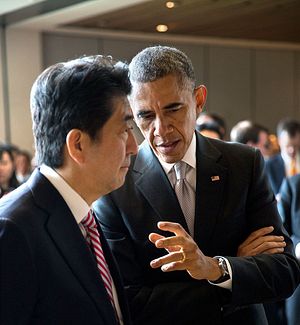With the Republican nomination for this fall’s U.S. presidential election all but locked in, Donald Trump caused a major stir again in Japan when he said Tokyo should pay for all the costs of stationing U.S. forces in Japan, or Japan will have to “defend themselves.”
The Japanese government promptly dismissed Trump’s remark as “unrealistic.” True, Trump’s statement is yet another reflection of his gross lack of basic knowledge (much less experience) in foreign policy. Even President Barack Obama could not restrain himself from joking about this during his White House Correspondence Dinner speech, suggesting that “there’s one area where Donald’s experience could be invaluable – and that’s closing Guantanamo. Because Trump knows a thing or two about running waterfront properties into the ground.”
Indeed, Trump’s accusation is far from the truth: Japan pays a considerable amount of money to cover the cost of U.S. forces stationed in Japan. On April 1, 2016, the revised host nation support agreement took effect, under which the size of the host nation support that Japan will shoulder over the next five years—approximately $1.6 billion per year—slightly increased compared to the previous five years. In terms of covering the cost for U.S. forces overseas, Japan is by far the most generous ally, covering at least approximately 75 percent of the operation costs for U.S. Forces in Japan. So, purely in dollar terms, Japan clearly pays its share.
Looking beyond Trump’s outlandish rhetoric, however, one has to recognize that the United States expressing its frustration over allies “not doing more” is hardly new. Back in June 2011, Robert Gates, Obama’s first secretary of defense, bluntly warned in his last speech before NATO that “there will be dwindling appetite and patience in the U.S. Congress – and in the American body politic writ large – to expend increasingly precious funds on behalf of nations that are apparently unwilling to devote the necessary resources or make the necessary changes to be serious and capable partners in their own defense.” Trump’s rhetoric, as provocative and unrealistic as it is, is largely consistent with the sentiment that Gates predicted as something that we would see in U.S. politics.
One might argue that Japan has been doing more. But the reality is, Japan still is not spending enough, even on its own defense. Despite the proposition by the current government that Japanese defense budget is “increasing,” the ration of defense spending to Japan’s Gross Domestic Product (GDP) has largely remain stagnant, hovering barely above 1 percent. Bluntly put, Japan was spending more on defense in FY 1997 than it is today. In fact, pressure on the acquisition budget is so high that the introduction of major platforms such as the F-35A, Global Hawk, V-22 Osprey, C-2, and P-1 – not to mention continuing investment in ballistic missile defense — is coming at the cost of a reduced budget for the items that are necessary to maintain readiness and sustainment: ammunition, improvements in logistical capability, and training. Put simply, the current level of Japan’s defense spending remains prohibitive for Japan to make the changes necessary to, in Gate’s word, “be serious and capable partners in their own defense.”
Legally speaking, with the security legislation that has been enacted on April 1, Japan today can definitely do more, as long as the contingencies in question are considered to affect Japan’s survival, or security of its allies and important partners. But if there is one takeaway from the debate over Japan’s security legislation last year, it’s that the Japanese public is clearly more willing to support the government in its effort to harden its own defense, while they remain uncertain about Japan joining broader international coalition to tackle security concerns that are far from their borders, especially when there is no clear mandate by the United Nations. Despite the alliance managers’ aspiration for the U.S.-Japan alliance to be a global strategic partnership, this may point to a serious disconnect between what Japan’s policy elites envisions and what the public is willing to allow its government to do.
There is no doubt that Trump’s portrayal of Japan and other U.S. allies as if they are mere free-riders on the U.S. security guarantee is seriously flawed. At the same time, however, his rhetoric—and also the political reality that Trump, despite constant criticism from policy elites, has emerged as the presumptive Republican nominee—suggests that a similar disconnect between what policy elites envision as the U.S. role in the world and what the voters expect from their government likely exists in the United States.
Rather than remain dismissive, the alliance managers in both countries may be better served if they consider Trump’s ascendance as a sign that they cannot be complacent and must double-down on their efforts to articulate the strategic importance of the U.S.-Japan alliance.

































